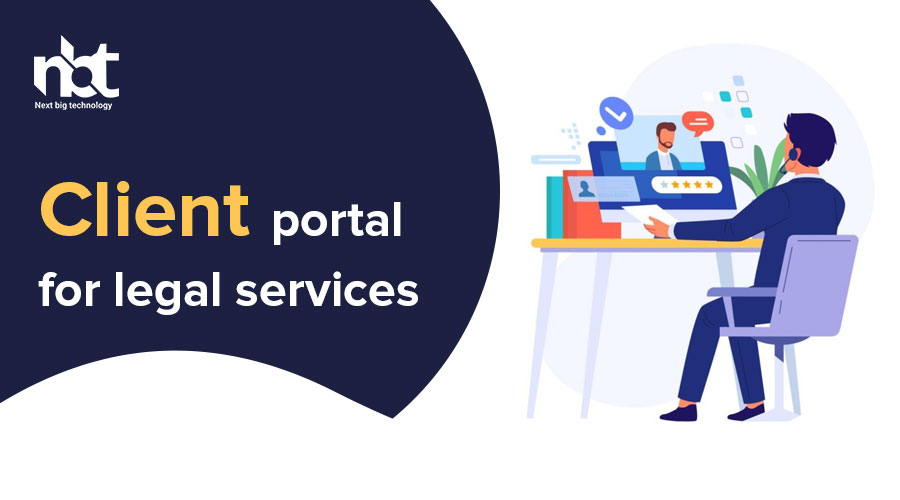Table of Contents
Client portal for legal services
In today’s fast-paced digital era, businesses across all industries are leveraging technology to streamline processes and enhance customer experiences. The legal sector, traditionally known for its reliance on paperwork and face-to-face interactions, is also embracing digital solutions to meet the evolving needs of clients. One such innovation is the implementation of client portals for legal services.
A client portal is an online platform that provides clients with secure access to their case information, documents, and communication with their legal representatives. This technology not only simplifies administrative tasks for law firms but also offers numerous benefits for clients, ultimately improving overall satisfaction and efficiency.
One of the primary advantages of a client portal is enhanced communication. Traditionally, clients would have to schedule appointments or rely on phone calls and emails to receive updates on their cases. With a portal, however, clients can access real-time information about their case status, upcoming appointments, and important deadlines from anywhere with an internet connection. This transparency fosters trust and confidence in the legal process, as clients feel more informed and involved in their legal matters.
Moreover, client portals streamline document management processes. Instead of exchanging paper documents or attachments via email, which can be cumbersome and insecure, clients can securely upload and access files through the portal. This not only reduces the risk of misplaced or lost documents but also ensures compliance with data protection regulations, such as GDPR or HIPAA.
Another significant benefit of client portals is increased efficiency. By centralizing case-related information and communication within a single platform, both clients and legal professionals can save time and reduce administrative overhead. Tasks such as scheduling appointments, sharing documents, and sending reminders can be automated, allowing lawyers to focus more on providing high-quality legal advice and representation.
Furthermore, client portals contribute to a more personalized and convenient experience for clients. Through features like personalized dashboards and notifications, clients can customize their portal experience according to their preferences and priorities. Whether they prefer to receive updates via email, SMS, or in-app notifications, the portal adapts to their communication preferences, enhancing overall satisfaction and engagement.
From a strategic standpoint, client portals can also differentiate law firms in a competitive market. By offering modern, user-friendly technology solutions, firms can attract tech-savvy clients who prioritize convenience and efficiency. Additionally, client portals can serve as a valuable marketing tool, demonstrating a firm’s commitment to innovation and client-centric service.
How to Create a Client portal for legal services
In the digital age, the legal industry is increasingly embracing technology to streamline processes, enhance client experiences, and improve overall efficiency. One such technological innovation that has gained traction is the creation of client portals. These portals serve as centralized platforms where legal practitioners can interact with clients securely, share documents, provide updates on case progress, and facilitate communication. If you’re a legal professional looking to establish a client portal for your practice, here’s a step-by-step guide to help you navigate the process effectively.
- Define Your Objectives: Before diving into the technical aspects, it’s crucial to clearly define your objectives for creating a client portal. Determine what specific functionalities you want the portal to offer and how it aligns with your firm’s goals and client needs. Whether it’s facilitating document sharing, scheduling appointments, or providing real-time case updates, understanding your objectives will guide the development process.
- Choose a Secure Platform: Security is paramount when it comes to handling sensitive legal information. Select a robust and reliable platform that offers end-to-end encryption, multi-factor authentication, and other advanced security features to safeguard client data. Additionally, ensure that the platform complies with relevant regulatory requirements, such as GDPR or HIPAA, depending on the nature of your practice.
- Customize the Portal: Tailor the client portal to reflect your brand identity and provide a seamless user experience. Incorporate your firm’s logo, colors, and branding elements to maintain consistency across all client interactions. Consider including customizable features such as personalized dashboards, document templates, and messaging tools to enhance usability and client engagement.
- Implement User Authentication: Implement robust user authentication mechanisms to verify the identity of clients accessing the portal. This may involve utilizing username-password combinations, biometric authentication, or integration with existing single sign-on (SSO) systems for added convenience and security.
- Integrate Document Management: Centralize document management within the client portal to streamline collaboration and information sharing. Enable clients to upload, download, and review legal documents securely, with version control and audit trails to track changes and ensure accountability. Intuitive search functionality and categorization options can further enhance document accessibility and organization.
- Enable Communication Channels: Foster seamless communication between clients and legal professionals by integrating messaging, video conferencing, and chatbot functionalities within the portal. This allows for real-time collaboration, clarification of queries, and timely updates on case developments, fostering transparency and trust.
- Ensure Compliance and Data Privacy: Prioritize compliance with data privacy regulations and industry standards to protect client confidentiality and maintain trust. Implement measures such as data encryption, access controls, and regular security audits to mitigate the risk of unauthorized access or data breaches.
- Provide Ongoing Support and Training: Offer comprehensive training and support resources to clients to ensure they can navigate the portal effectively. Provide user guides, tutorials, and responsive customer support channels to address any questions or concerns promptly.
- Gather Feedback and Iterate: Continuously gather feedback from clients and internal stakeholders to identify areas for improvement and iterate on the portal’s features and functionalities. Solicit input through surveys, user testing sessions, and performance analytics to enhance user satisfaction and optimize the portal’s performance over time.
Why Should You Go for Client portal for legal services
In today’s fast-paced digital world, the legal landscape is evolving rapidly. Law firms are constantly seeking innovative ways to enhance client satisfaction, streamline processes, and stay ahead of the competition. One such innovation that has revolutionized the way legal services are delivered is the client portal. So, why should you embrace this game-changing technology for your legal practice? Let’s delve into the compelling reasons:
- Enhanced Communication: A client portal serves as a centralized communication hub, allowing seamless interaction between lawyers and clients. Through secure messaging features, clients can easily communicate their queries, share documents, and receive updates on their cases in real-time. This fosters transparency and strengthens the attorney-client relationship.
- 24/7 Accessibility: Unlike traditional methods that are bound by office hours, a client portal provides round-the-clock accessibility to legal services. Clients can access important documents, review case progress, and make inquiries at their convenience, empowering them with greater control over their legal matters.
- Improved Efficiency: With a client portal, mundane tasks such as scheduling appointments, sending reminders, and sharing documents can be automated, freeing up valuable time for attorneys to focus on more substantive aspects of their cases. This boosts operational efficiency and enables law firms to handle a higher volume of clients effectively.
- Enhanced Security: Security is paramount in the legal profession, where sensitive information is exchanged regularly. Client portals employ robust encryption protocols and multi-factor authentication to safeguard client data from unauthorized access or breaches, ensuring confidentiality and compliance with data protection regulations.
- Cost-Effective Solution: Implementing a client portal eliminates the need for extensive paperwork, postage, and administrative overhead associated with traditional communication methods. By transitioning to a digital platform, law firms can significantly reduce operational costs while offering clients a more efficient and convenient service experience.
- Competitive Edge: In today’s competitive legal market, adopting innovative technologies such as client portals sets your firm apart from the competition. It demonstrates your commitment to embracing modern solutions to meet the evolving needs of clients, thereby attracting new business and retaining existing clientele.
- Streamlined Case Management: Client portals integrate robust case management functionalities, allowing attorneys to organize case files, track deadlines, and collaborate with colleagues seamlessly. This streamlines workflow processes, minimizes errors, and ensures that cases progress smoothly from inception to resolution.
- Client Empowerment: By providing clients with direct access to their case information and legal resources through a user-friendly portal interface, law firms empower them to make informed decisions and actively participate in the legal process. This transparency instills trust and confidence in the firm’s services, leading to greater client satisfaction and loyalty.
Market Prospects of Client portal for legal services and Platforms
In today’s fast-paced digital world, the legal industry is undergoing a significant transformation. With the advancement of technology, law firms and legal professionals are embracing innovative solutions to streamline their operations and enhance client satisfaction. One such solution gaining traction is client portals for legal services and platforms.
Client portals are secure online platforms that allow law firms to communicate, collaborate, and share documents with their clients in a centralized and efficient manner. These portals offer a wide range of features tailored specifically to meet the needs of legal professionals and their clients, including document management, case tracking, secure messaging, billing, and more.
The market prospects for client portals in the legal industry are promising and multi-faceted. Here’s a closer look at why:
- Efficiency and Productivity: Client portals streamline communication between lawyers and clients, reducing the need for endless phone calls and emails. This increased efficiency translates into time savings for both parties, allowing lawyers to focus more on providing quality legal services and clients to access information and updates conveniently.
- Enhanced Client Experience: In today’s digital age, clients expect convenience and accessibility from their service providers, including law firms. Client portals empower clients to access important documents, track case progress, and communicate with their lawyers at their convenience, thereby enhancing overall client satisfaction and loyalty.
- Security and Confidentiality: Data security and confidentiality are paramount in the legal industry. Client portals provide a secure environment for sharing sensitive legal documents and information, mitigating the risk of data breaches and unauthorized access. This heightened security is a compelling factor for law firms and clients alike.
- Competitive Advantage: As client expectations evolve, law firms that embrace technology-driven solutions like client portals gain a competitive edge in the market. By offering modern and efficient communication channels, law firms can attract new clients, retain existing ones, and differentiate themselves from competitors.
- Scalability and Flexibility: Client portals are highly scalable and adaptable to the diverse needs of law firms of all sizes, from solo practitioners to large corporate firms. They can be customized to suit specific practice areas, client demographics, and workflow preferences, providing flexibility and agility in an ever-changing legal landscape.
- Revenue Generation: Client portals offer opportunities for additional revenue streams through value-added services such as premium access tiers, document automation, online payment processing, and more. By monetizing these features, law firms can generate incremental revenue while delivering added value to their clients.
- Compliance and Regulatory Requirements: With increasingly stringent regulatory requirements governing data privacy and security, client portals help law firms ensure compliance with industry standards and regulations such as GDPR and HIPAA. By adhering to these standards, law firms build trust and credibility with their clients and regulatory authorities.
Essential Features of a Client portal for legal services
In the rapidly evolving landscape of legal services, the integration of technology has become essential for firms to thrive. One such technological advancement that has revolutionized the way legal professionals interact with their clients is the client portal. A client portal serves as a centralized platform where clients can access documents, communicate securely, and stay updated on the progress of their cases. However, not all client portals are created equal. To truly streamline operations and enhance client satisfaction, certain essential features must be present. Let’s delve into the key components that make a client portal indispensable for modern legal practices.
- Secure Document Storage and Sharing: Security is paramount when it comes to legal matters. A robust client portal should offer encrypted storage and seamless sharing capabilities for sensitive documents such as contracts, court filings, and correspondence. Advanced permission settings ensure that only authorized users can access confidential information, providing peace of mind for both clients and attorneys.
- Real-Time Communication Channels: Effective communication is the cornerstone of successful attorney-client relationships. A client portal should facilitate seamless communication through various channels, including messaging, video conferencing, and email integration. Instant notifications keep clients informed of important updates and allow them to reach out to their legal representatives whenever necessary, fostering transparency and trust.
- Case Management Tools: Managing cases efficiently is essential for legal practitioners to stay organized and meet deadlines. A comprehensive client portal should offer robust case management tools, including task tracking, calendaring, and deadline reminders. Customizable workflows enable attorneys to streamline their processes and allocate resources effectively, ultimately improving productivity and client satisfaction.
- Billing and Payment Integration: Simplifying the billing process benefits both clients and law firms alike. An integrated billing and payment system within the client portal allows clients to view invoices, track expenses, and make payments securely online. Automated billing reminders reduce the administrative burden on attorneys and ensure timely payments, enhancing cash flow and optimizing financial operations.
- Document Collaboration and e-Signature Capabilities: Collaboration is key in the legal profession, especially when multiple stakeholders are involved in a case. A client portal with built-in document collaboration features enables seamless collaboration between attorneys, clients, and third parties. Additionally, e-signature capabilities streamline the signing process for legal documents, eliminating the need for printing, scanning, and mailing physical copies.
- Mobile Accessibility: In an increasingly mobile world, flexibility is essential. A mobile-responsive client portal allows clients to access important documents and communicate with their attorneys on the go, anytime and anywhere. Mobile accessibility enhances convenience and responsiveness, empowering clients to stay connected and engaged throughout the legal process.
- Data Analytics and Reporting: Data-driven insights empower legal practitioners to make informed decisions and improve their services continuously. A client portal equipped with robust analytics and reporting features provides valuable insights into client behavior, case trends, and performance metrics. By leveraging data analytics, law firms can identify areas for improvement, optimize their processes, and deliver exceptional client experiences.
Advanced Features Client portal for legal services
In the fast-paced world of legal services, staying connected with clients and ensuring efficient communication is paramount. With advancements in technology, client portals have emerged as powerful tools, revolutionizing the way legal professionals interact with their clients. These portals offer a myriad of advanced features designed to streamline processes, enhance collaboration, and provide superior service. Let’s delve into some of the most notable features that make client portals indispensable in the realm of legal services.
- Secure Document Management: One of the primary functions of client portals is secure document management. These portals provide a centralized platform where clients can securely upload and access important legal documents. Advanced encryption techniques ensure data security and compliance with privacy regulations, giving clients peace of mind knowing their sensitive information is protected.
- Real-Time Communication: Effective communication is key in the legal profession. Client portals facilitate real-time communication between attorneys and clients through messaging features, eliminating the need for lengthy email chains or phone tag. Whether it’s discussing case updates, sharing insights, or addressing client concerns, instant communication fosters transparency and builds trust.
- Task Management and Collaboration: Client portals offer robust task management tools that enable attorneys to assign tasks, set deadlines, and track progress effortlessly. Clients can stay informed about the status of their cases, view upcoming deadlines, and collaborate with their legal team in a transparent manner. This promotes accountability and ensures that everyone is on the same page throughout the legal process.
- Billing and Invoicing Integration: Simplifying the billing process is another key feature of client portals. Integrated billing and invoicing functionalities allow clients to view and pay invoices online securely. Automated billing reminders help minimize late payments, while detailed billing reports provide clients with transparency and insight into the services rendered.
- Document Automation and E-Signature: Client portals streamline document preparation and signing through automation tools and electronic signature capabilities. Attorneys can create customized legal documents efficiently, while clients can review and sign documents digitally from any device, saving time and reducing paperwork.
- Client Education and Resources: Many client portals offer educational resources and knowledge repositories to empower clients with relevant legal information. From FAQs and legal articles to video tutorials and webinars, these resources help clients understand their rights, responsibilities, and the legal processes involved in their cases.
- Mobile Accessibility: In today’s mobile-centric world, client portals that offer mobile accessibility are invaluable. Mobile apps or responsive web designs ensure that clients can access their portal anytime, anywhere, using their smartphones or tablets. This flexibility enhances convenience and fosters engagement, as clients can stay connected on the go.
Client portal for legal services Timelines
In the fast-paced world of legal services, efficiency and organization are paramount. Client portals have emerged as indispensable tools for law firms, offering a streamlined approach to communication, document management, and case tracking. Among the many features that enhance client satisfaction and operational efficiency, timelines within client portals stand out as particularly crucial.
Timelines serve as dynamic visual aids, providing clients with a clear overview of their case progression, key milestones, and upcoming deadlines. Here’s why timelines within client portals are essential for legal service providers and their clients:
- Transparency and Accountability: Timelines empower clients by keeping them informed about the status of their case in real-time. From initial consultation to resolution, clients can easily track the progress of their matter, fostering transparency and trust in the legal process. With access to a detailed timeline, clients feel more involved and assured of their legal representation.
- Effective Communication: Client portals with integrated timelines facilitate seamless communication between attorneys and clients. Rather than relying on sporadic updates via email or phone calls, clients can access the portal at any time to view the latest developments in their case. This reduces the need for repetitive inquiries and ensures that all parties are on the same page regarding important events and deadlines.
- Deadline Management: Legal proceedings often involve numerous deadlines and procedural requirements. Timelines within client portals serve as invaluable tools for deadline management, allowing both clients and attorneys to stay organized and proactive. By displaying upcoming deadlines prominently, clients can take timely actions, such as providing necessary documents or attending court hearings, thereby minimizing the risk of missed deadlines and associated consequences.
- Efficiency and Productivity: By centralizing case-related information and deadlines in one accessible location, client portals streamline administrative tasks for legal professionals. Attorneys can spend less time fielding inquiries about case status and deadlines, freeing up valuable time to focus on substantive legal work. Moreover, the ability to update timelines in real-time ensures that everyone involved is working with the most current information, leading to increased efficiency and productivity across the board.
- Enhanced Client Experience: Ultimately, the integration of timelines within client portals enhances the overall client experience. By providing clients with a user-friendly interface to track their case progress and deadlines, law firms demonstrate their commitment to client satisfaction and service excellence. Clients appreciate the convenience and transparency offered by such portals, leading to higher levels of client retention and positive word-of-mouth referrals.
How Much Does It Cost to Build a Client portal for legal services?
In today’s digital age, law firms are increasingly turning to client portals to streamline communication, enhance security, and improve overall client experience. A client portal serves as a centralized platform where clients can access important documents, track case progress, and communicate with their legal representatives securely. However, one of the key considerations for law firms embarking on the journey of implementing a client portal is the cost involved. So, how much does it really cost to build a client portal for legal services? Let’s delve into the factors that influence the cost of development.
- Customization Requirements: The cost of building a client portal largely depends on the level of customization required. Law firms may opt for a basic, off-the-shelf solution or invest in a fully customized portal tailored to their specific needs. Customization involves design, features, security protocols, and integration with existing systems. The more tailored the portal, the higher the development cost.
- Features and Functionality: The cost of development also varies based on the features and functionality desired in the client portal. Basic features may include document storage, messaging, and calendar integration, while advanced functionalities such as electronic signatures, billing integration, and client intake forms will incur additional costs.
- Security Measures: Security is paramount when it comes to client portals in the legal sector. Implementing robust security measures such as encryption, multi-factor authentication, and regular security audits adds to the development cost but is essential for safeguarding sensitive client information and maintaining compliance with data protection regulations.
- Integration with Existing Systems: Law firms often have existing systems in place such as case management software, accounting software, or document management systems. Integrating the client portal with these systems requires additional development effort and may contribute to the overall cost.
- Scalability: A client portal should be scalable to accommodate the growing needs of the law firm and its clients. Building a scalable solution involves designing a flexible architecture that can handle increased user load and additional features in the future. While scalability adds to the initial development cost, it ensures long-term viability and minimizes the need for major upgrades down the line.
- Maintenance and Support: After the initial development phase, ongoing maintenance and support are necessary to keep the client portal running smoothly. This includes software updates, bug fixes, security patches, and technical support for users. Factoring in the cost of maintenance and support is crucial for estimating the total cost of ownership over time.
How to Create a Client portal for legal services – Team and Tech Stack
In today’s digital age, legal services are undergoing a transformation. As clients demand greater accessibility and efficiency, law firms are turning to technology to meet these expectations. One crucial aspect of this digital shift is the creation of a client portal—a secure online platform where clients can access legal documents, communicate with their attorneys, and track the progress of their cases. In this article, we’ll explore how to create a client portal for legal services, focusing on the necessary team and the tech stack required to make it a success.
Understanding the Client Portal
Before diving into the technical details, it’s essential to understand what a client portal entails. A client portal is essentially a secure digital gateway that facilitates communication and collaboration between clients and their legal representatives. It provides clients with a centralized platform to access important documents, exchange messages with their attorneys, schedule appointments, and monitor case updates in real-time. Ultimately, a well-designed client portal enhances transparency, streamlines workflows, and improves overall client satisfaction.
Building the Right Team
Creating a client portal for legal services requires collaboration across various disciplines. Here are the key roles that should be part of your team:
- Project Manager: Responsible for overseeing the entire development process, ensuring that the project stays on track, and coordinating communication between different team members.
- Legal Experts: Legal professionals who understand the specific needs and requirements of clients in the legal industry. They provide insights into the features and functionalities that the client portal should offer to meet client expectations effectively.
- UX/UI Designers: Designers who focus on creating an intuitive and user-friendly interface for the client portal. Their goal is to ensure that clients can navigate the portal easily and access the information they need without any confusion.
- Developers: Skilled software developers who have experience building secure and scalable web applications. They are responsible for turning the design concepts into a functional client portal, incorporating features such as document management, secure messaging, and authentication.
- Security Experts: Professionals with expertise in cybersecurity who can implement robust security measures to protect sensitive client data. They ensure compliance with legal regulations such as GDPR and HIPAA and guard against potential security threats.
Choosing the Right Tech Stack
Selecting the appropriate technologies is crucial for building a robust and efficient client portal. Here are some essential components of the tech stack:
- Backend Framework: Choose a backend framework such as Django, Ruby on Rails, or Laravel to handle the server-side logic and database management.
- Database: Use a reliable database management system like PostgreSQL or MySQL to store client data securely.
- Frontend Framework: Opt for a frontend framework like React.js or AngularJS to create dynamic and responsive user interfaces for the client portal.
- Authentication: Implement secure authentication mechanisms such as OAuth or JSON Web Tokens (JWT) to verify the identity of clients and ensure that only authorized users can access the portal.
- Encryption: Utilize encryption protocols such as SSL/TLS to encrypt data transmitted between clients and the server, protecting it from unauthorized access.
- APIs: Integrate APIs for third-party services such as document management systems, e-signature platforms, and payment gateways to enhance the functionality of the client portal.
Client portal for legal services Process
In today’s fast-paced digital world, the legal landscape is evolving, and with it, the way legal services are delivered. One of the most significant advancements in this regard is the implementation of client portals. These platforms serve as centralized hubs where clients can access documents, communicate with their legal representatives, and track the progress of their cases, all from the convenience of their own devices. In this article, we delve into the process of setting up a client portal for legal services and explore its benefits for both law firms and their clients.
- Understanding Client Needs: Before diving into the technical aspects of setting up a client portal, it’s crucial to understand the specific needs and preferences of your clients. Conducting surveys or interviews can provide valuable insights into the features and functionalities they value most. Whether it’s real-time case updates, secure document sharing, or appointment scheduling, tailoring the portal to meet these needs is essential for its success.
- Choosing the Right Platform: With numerous options available in the market, selecting the right platform for your client portal is paramount. Factors to consider include security features, ease of use, customization options, and integration capabilities with existing systems such as case management software. Opting for a user-friendly platform that prioritizes data security will instill confidence in your clients and foster trust in your legal services.
- Customizing the Portal: Once a platform has been chosen, customization is key to creating a seamless user experience. Branding the portal with your firm’s logo and colors helps reinforce your identity and fosters brand recognition. Additionally, tailoring the interface to align with your clients’ preferences ensures intuitive navigation and enhances usability. Providing clear instructions and tutorials can further assist clients in utilizing the portal effectively.
- Implementing Security Measures: Security is of utmost importance when dealing with sensitive legal information. Implementing robust security measures such as encryption, multi-factor authentication, and regular security audits helps safeguard client data against unauthorized access or breaches. Educating clients on best practices for maintaining the security of their accounts, such as using strong passwords and avoiding public Wi-Fi networks, is also essential.
- Providing Ongoing Support: Launching a client portal is just the beginning; ongoing support is crucial for ensuring its continued success. Offering training sessions or resources to familiarize clients with the portal’s features can help mitigate any potential issues or confusion. Promptly addressing any technical issues or concerns raised by clients demonstrates your commitment to providing exceptional service and enhances overall client satisfaction.
Next Big Technology – Your Trusted Client portal for legal services Partner
In an era defined by technological advancements and digital transformations, the legal industry is not immune to the winds of change. With the emergence of innovative platforms like Next Big Technology, accessing legal services has become more convenient, efficient, and trustworthy than ever before. Let’s delve into how Next Big Technology is revolutionizing the landscape of legal services, serving as your ultimate ally and trusted partner.
Empowering Clients with Convenience: Gone are the days of cumbersome paperwork and lengthy wait times. Next Big Technology brings legal services to your fingertips, offering a seamless and user-friendly client portal. From consultations to document submissions and case tracking, everything can be conveniently managed online, saving you time and effort. Whether you’re at home, in the office, or on the go, access to legal assistance is just a few clicks away.
Unparalleled Accessibility: Accessibility is key, especially when it comes to legal matters. Next Big Technology ensures that legal services are accessible to everyone, regardless of geographical barriers or time constraints. With 24/7 availability and a responsive support team, clients can seek guidance and assistance whenever they need it, ensuring peace of mind and timely resolution of their legal concerns.
Trusted Expertise at Your Disposal: Legal matters often require specialized expertise and insight. With Next Big Technology, clients gain access to a network of experienced attorneys and legal professionals who specialize in various fields. Whether it’s business law, family law, or intellectual property rights, rest assured that your case will be handled by seasoned experts with a track record of success. From initial consultation to case resolution, you can trust Next Big Technology to have your best interests at heart.
Secure and Confidential: Privacy and confidentiality are paramount when it comes to legal matters. Next Big Technology prioritizes the security of your sensitive information, employing state-of-the-art encryption and data protection measures to safeguard your privacy. Whether you’re sharing documents, communicating with your attorney, or discussing case details, rest assured that your information is kept strictly confidential, giving you the confidence to pursue your legal objectives without fear or hesitation.
Transparent and Affordable Pricing: Legal services shouldn’t break the bank. Next Big Technology believes in transparent and affordable pricing, ensuring that quality legal assistance is accessible to everyone, regardless of budget constraints. With clear pricing structures and no hidden fees, clients can make informed decisions about their legal options without worrying about unexpected costs or financial burdens.
Enterprise Client portal for legal services
In today’s fast-paced world, efficiency and accessibility are key pillars of success in any industry. For the legal sector, where time is of the essence and communication is paramount, the integration of technology has become a game-changer. One such technological advancement making waves in the legal sphere is the Enterprise Client Portal. This innovative solution is transforming the way legal services are delivered and received, enhancing collaboration, streamlining processes, and ultimately, delivering better outcomes for both clients and legal professionals.
Enhancing Collaboration and Communication: One of the primary benefits of an Enterprise Client Portal for legal services is its ability to facilitate seamless collaboration and communication between clients and their legal representatives. Gone are the days of endless email threads and missed phone calls. With a client portal, stakeholders can communicate in real-time, securely share documents, and track progress on cases from anywhere, at any time. This level of transparency and accessibility fosters trust and strengthens the client-lawyer relationship, leading to more informed decision-making and ultimately, better outcomes.
Streamlining Processes and Increasing Efficiency: Traditional legal processes often involve a myriad of paperwork, manual tasks, and administrative burdens. However, with an Enterprise Client Portal, these processes are streamlined and automated, allowing legal professionals to focus their time and energy on what truly matters – providing high-quality legal services. From document management and electronic signatures to task assignment and billing, the portal centralizes all aspects of case management, eliminating redundancies and reducing the risk of errors. This not only saves time and resources but also enhances overall efficiency and productivity within the firm.
Empowering Clients with Self-Service Capabilities: Another notable feature of Enterprise Client Portals is their self-service capabilities, empowering clients to take greater control over their legal matters. Through the portal, clients can access important documents, track case progress, schedule appointments, and even make payments – all with the click of a button. This level of autonomy not only improves the client experience but also reduces the administrative burden on legal professionals, allowing them to focus on providing expert guidance and counsel.
Ensuring Security and Compliance: Security and confidentiality are paramount in the legal industry, and Enterprise Client Portals are designed with these principles in mind. Built-in encryption, multi-factor authentication, and role-based access controls ensure that sensitive information remains protected at all times. Additionally, client portals adhere to strict compliance standards, such as GDPR and HIPAA, providing peace of mind to both clients and legal professionals alike.
Top Client portal for legal services Companies
In the digital era, where connectivity and efficiency are paramount, legal services companies are increasingly turning to client portals to streamline operations and enhance client satisfaction. These platforms serve as centralized hubs where legal firms can securely interact with clients, exchange documents, provide updates on cases, and facilitate communication. With a plethora of options available, choosing the right client portal is crucial for legal firms aiming to stay ahead in today’s competitive landscape. Here, we delve into some of the top client portals tailored specifically for legal services companies.
-
-
Next Big Technology:
Next Big Technology is one of the top development companies for the high-quality development of mobile apps and web development services. They have having experienced in-house team of developers who provide top-notch development services according to the business requirements. NBT provides highly business-oriented services and implements all the latest and trending tools and technologies. They always work hard to deliver a top-notch solution at an affordable cost. They are having experience of more than 13 years and delivered lots of projects around the globe to businesses and clients.
NBT is highly focused on providing top-notch development solutions at a very affordable cost. By using their market experience and development experience, they are delivering proper solutions to clients and various industries for their custom requirements.
Location: India, USA, UK, Australia
Hourly Rate :< $25 per Hour
Employees: 50 – 249
Focus Area
- Mobile App Development
- App Designing (UI/UX)
- Software Development
- Web Development
- AR & VR Development
- Big Data & BI
- Cloud Computing Services
- DevOps
- E-commerce Development
Industries Focus
- Art, Entertainment & Music
- Business Services
- Consumer Products
- Designing
- Education
- Financial & Payments
- Gaming
- Government
- Healthcare & Medical
- Hospitality
- Information Technology
- Legal & Compliance
- Manufacturing
- Media
-
- MyCase: MyCase is another leading client portal trusted by legal practitioners worldwide. This platform offers robust features such as document management, secure client communication, billing, and online payments, all within a single interface. MyCase prioritizes simplicity and accessibility, making it easy for both legal professionals and clients to navigate complex legal processes effortlessly.
- Filevine: Filevine is renowned for its intuitive client portal designed to enhance collaboration and efficiency within legal teams. From document sharing to task management and reporting, Filevine provides a comprehensive suite of tools tailored to the unique needs of legal services companies. With its emphasis on automation and integration, Filevine enables legal firms to optimize their workflows and deliver superior outcomes for clients.
- PracticePanther: PracticePanther offers a feature-rich client portal solution that caters to the diverse needs of legal professionals. Its cloud-based platform facilitates seamless client communication, document management, time tracking, and billing, empowering legal firms to manage every aspect of their practice efficiently. PracticePanther’s mobile-friendly interface ensures that legal professionals can stay connected with clients and access critical information anytime, anywhere.
- CosmoLex: CosmoLex is a comprehensive practice management software that includes a powerful client portal module. With its integrated billing, accounting, and client communication features, CosmoLex simplifies the complexities of legal practice management. Legal firms can leverage CosmoLex’s secure client portal to streamline client interactions, share documents securely, and track case progress with ease.
FAQs on Client portal for legal services
In today’s digital age, client portals have become an essential tool for law firms to streamline communication, enhance client satisfaction, and improve efficiency. If you’re considering implementing a client portal for your legal services, you likely have some questions. Below, we’ve compiled a list of frequently asked questions (FAQs) to help you understand what client portals are all about:
- What is a client portal? A client portal is a secure online platform that allows law firms to share documents, messages, and other information with their clients in a centralized, organized manner. It provides clients with 24/7 access to their case files and communications with their attorney.
- How does a client portal benefit my legal practice? Client portals offer several benefits, including improved communication, enhanced client satisfaction, increased efficiency, and reduced administrative costs. By providing clients with easy access to their case information, you can streamline processes and strengthen client relationships.
- Is a client portal secure? Yes, client portals are built with robust security measures to protect sensitive client information. They typically use encryption, multi-factor authentication, and other security protocols to ensure data confidentiality and integrity.
- What features should I look for in a client portal? When choosing a client portal for your legal practice, look for features such as document sharing, secure messaging, task management, calendar integration, and customizable branding. Make sure the portal is user-friendly for both you and your clients.
- How do clients access the portal? Clients can access the portal through a web browser on their computer or mobile device. Upon registration, they’ll receive login credentials from your firm, allowing them to securely access their account anytime, anywhere.
- Can clients upload documents to the portal? Yes, most client portals allow clients to upload documents directly to their account. This feature simplifies the document exchange process and ensures that all relevant information is stored in one central location.
- How does the portal facilitate communication between clients and attorneys? Client portals typically include secure messaging capabilities that enable clients to communicate with their attorney directly within the platform. This feature streamlines communication and ensures that all correspondence is documented for future reference.
- Is training required to use a client portal? Client portals are designed to be intuitive and user-friendly, requiring minimal training for both attorneys and clients. However, your firm may offer training sessions or provide instructional materials to help clients get acquainted with the portal’s features.
- Can I customize the portal to match my firm’s branding? Yes, many client portals offer customization options, allowing you to brand the platform with your firm’s logo, colors, and other visual elements. This helps reinforce your firm’s identity and provides a cohesive experience for clients.
- How do I get started with implementing a client portal for my legal practice? To get started, research different client portal solutions, evaluate their features and pricing, and choose the one that best fits your firm’s needs. Once selected, work with the provider to set up and customize the portal, and then communicate its availability to your clients.
Thanks for reading our post “Client portal for legal services”. Please connect with us to learn more about the Client portal for legal.

















